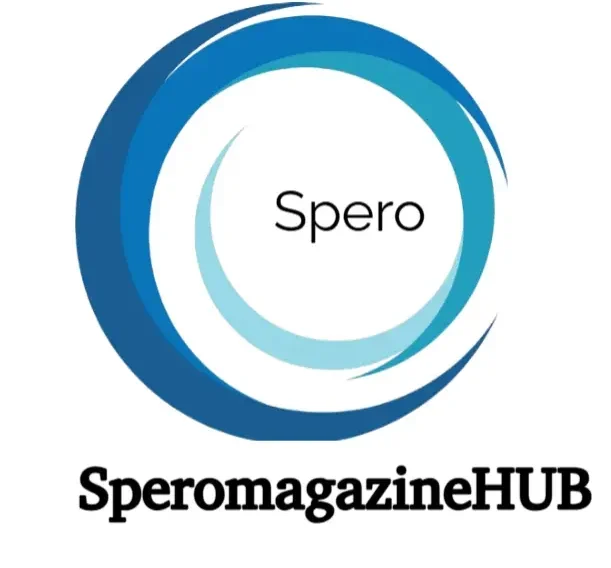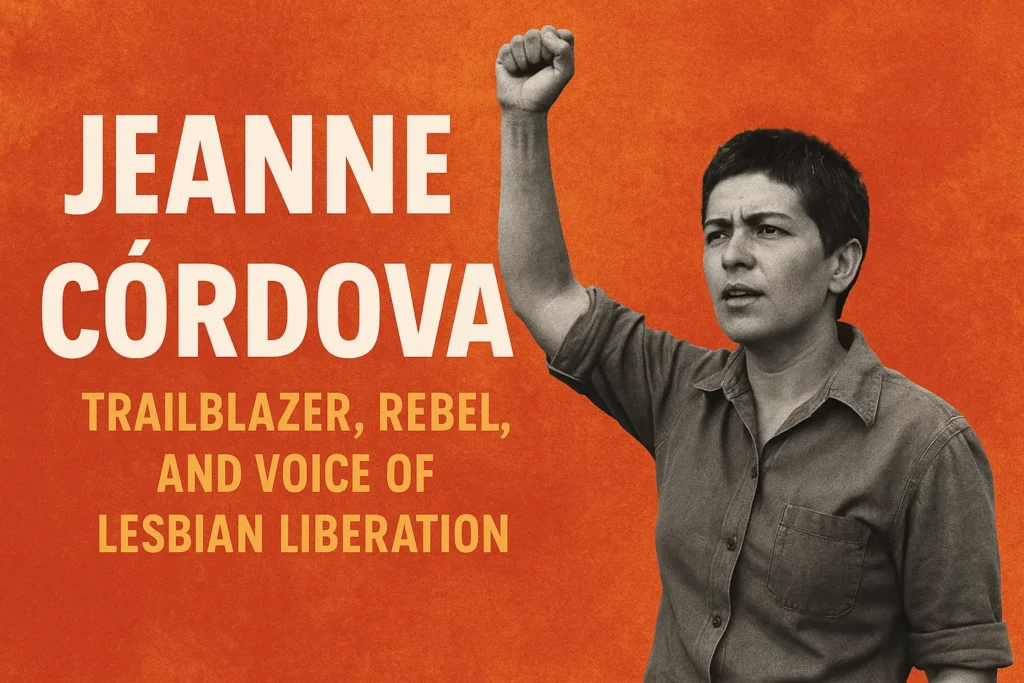She didn’t whisper change. She shouted it. From newsrooms to marches, from convent walls to crowded streets, Jeanne Córdova lived like a storm that refused to quiet.
The Spark in the Silence
Imagine this.
A young woman in a Catholic habit. Kneeling. Praying.
The world expects obedience. She chooses rebellion.
That was Jeanne Córdova in the late 1960s — a Latina nun who would one day become one of America’s fiercest lesbian feminists.
Her story begins not in chaos, but in silence — a silence she could no longer stand.
She was born in Bremerhaven, Germany, in 1948. Her family soon moved to California. A place of beaches, blinding light, and buried contradictions. Jeanne grew up in a strict Catholic home, surrounded by faith and the fear of sin. But she also carried questions — the kind that shake foundations.
By 18, she joined the Immaculate Heart of Mary convent in Los Angeles.
It didn’t last.
Love — forbidden love — found her there. A love that had no name yet, at least not one spoken out loud in holy halls.
So she left.
And that leaving became her first act of revolution.
From Nun to Newsroom
Córdova didn’t walk into activism. She crashed into it.
In 1970, Los Angeles was roaring. Feminism was growing teeth. The Stonewall riots had happened a year before, and something electric was in the air. Jeanne stepped into the chaos and found her place.
She joined the Los Angeles chapter of the Daughters of Bilitis, the first lesbian civil rights organization in the U.S. — and soon became its president. When she looked at the group’s newsletter, The Ladder, she saw potential. A voice waiting for amplification.
So, she created one of her own.
In 1971, she founded The Lesbian Tide — a radical newspaper that became the mouthpiece of lesbian feminism. The Tide wasn’t soft. It wasn’t polite. It printed what others wouldn’t say.
Articles screamed truth — about sexism, racism, sexuality, and survival.
Jeanne ran it from her home, fueled by coffee, anger, and relentless conviction.
“Visibility is everything,” she wrote once. “We must speak, even when our voices tremble.”
And they did. Loudly.
The Birth of Lesbian Nation
Jeanne Córdova’s activism didn’t stop at words. It moved into streets, into meeting rooms, into law and love.
She helped organize the West Coast Lesbian Conference in 1973. It was raw, messy, powerful. Thousands of women gathered to talk about liberation and identity — many for the first time. Jeanne stood at the center, demanding that lesbian voices lead feminism, not follow it.
The conference was more than an event. It was a rupture.
A declaration that lesbians weren’t side notes in women’s liberation — they were its architects.
This era birthed the concept of “Lesbian Nation” — a vision Jeanne helped shape. A world where women could live free from patriarchy’s rules. Radical. Defiant. Utopian, even.
Was it perfect? No.
But it gave shape to a dream that had lived too long in whispers.
Activism with Teeth
Some activists write. Some march. Jeanne did both — and then built systems to make sure neither was forgotten.
Through The Lesbian Tide, she chronicled police harassment, workplace discrimination, and the political rise of LGBTQ rights. Her articles were part journalism, part manifesto.
She also helped create the National Lesbian Feminist Organization (NLFO) in 1978. It connected local lesbian groups across the U.S., building one of the first coordinated feminist-liberal alliances for queer women.
It wasn’t easy.
Jeanne often fought with gay male activists who sidelined lesbian issues.
She clashed with feminists who wanted to separate sexuality from gender equality.
But she didn’t care about comfort. She cared about truth.
“You cannot liberate half of yourself,” she said. “Freedom must be whole.”
That line became her life’s thesis.
Building Queer Media Before It Was Cool
If you scroll through today’s LGBTQ blogs and digital magazines, you’ll see echoes of Jeanne everywhere.
Before BuzzFeed, before Autostraddle, before The Advocate became mainstream — there was The Lesbian Tide.
The paper documented everything: politics, art, music, sexuality, violence, hope. Jeanne’s editorial style was sharp. She mixed raw reporting with passionate commentary — something unheard of in queer journalism at the time.
She later contributed to The Advocate, Los Angeles Times, and numerous anthologies. Her work turned personal pain into public education.
In the 1980s and 1990s, she expanded her reach. She wrote Kicking the Habit — an autobiographical book about her transformation from nun to lesbian activist. It was funny, unflinching, and deeply human.
She also co-founded Square Peg Magazine, focusing on multicultural LGBTQ perspectives. Jeanne never stopped evolving, never settled into one label.
A Latina Voice in a White Movement
Here’s something most people miss: Jeanne wasn’t just a lesbian activist. She was a Chicana lesbian activist.
That mattered.
In an era when white feminism often dominated the narrative, Jeanne stood out — not quietly. She wrote and spoke about the double marginalization she faced: for being queer, and for being brown.
Her visibility challenged the idea that queer liberation was a white issue.
She worked alongside other Chicana feminists like Cherríe Moraga and Gloria Anzaldúa, pushing for inclusion long before “intersectionality” became an academic term.
“I am not split,” she wrote. “I am both — Latina and lesbian — whole, fierce, indivisible.”
Her life became a blueprint for future generations of queer people of color navigating identity and activism.
Love and Legacy
Behind every movement-maker is a life full of quiet moments. Jeanne’s love story was one of them.
She met Lynn Harris Ballen, a journalist and feminist activist. They became partners in every sense — personal, political, spiritual. Together, they built the Jeanne Córdova Word Scholarship Fund, supporting LGBTQ journalists and writers who continue her mission: tell the truth, even when it hurts.
In 2016, Jeanne died of cancer. She was 67.
Before passing, she wrote an open letter to her community. It was raw, defiant, full of love.
“I had a wonderful life a worked hard and I partied hard. I loved. And I believed.”
It wasn’t a goodbye. It was a torch pass.
Why Jeanne Córdova Still Matters
Fast forward to now.
2025.
Queer rights are still debated. Feminism still fractures. Journalism still fights for truth.
And Jeanne’s voice? Still echoes.
Her work paved the path for queer media, intersectional feminism, and visibility politics. Every Pride flag, every inclusive newsroom, every young queer writer finding their voice online — there’s a line that traces back to her typewriter.
She showed what happens when one person refuses to live quietly.
Did you know?
The Lesbian Tide archives are now part of major university collections. Scholars study her words like scripture. That’s how revolutions live on — through ink and memory.
Key Lessons from Jeanne Córdova’s Life
| Theme | Lesson | Modern Relevance |
| Identity | Embrace complexity; don’t simplify yourself to fit systems. | Intersectional feminism, queer inclusivity. |
| Media | Control the narrative before someone else does. | Independent media, social storytelling. |
| Activism | Real change demands discomfort. | Grassroots organizing, online activism. |
| Faith | Leaving faith doesn’t mean losing purpose. | Spiritual redefinition, personal freedom. |
| Love | Activism without love burns out. | Sustainable social movements. |
A Blueprint for Future Activists
So, what can we learn from Jeanne Córdova today?
Plenty.
- Start with your story. She did.
- Make media your weapon. She built platforms before the internet.
- Don’t wait for permission. No one gave her a microphone; she made one.
- Stand where it’s hard to stand. That’s where history shifts.
- Build communities, not cliques. She connected voices across lines.
If you’ve ever felt “too different,” “too much,” or “too loud,” Jeanne’s life is proof that those are strengths, not flaws.
Future Outlook: The Echo of Her Revolution
Jeanne’s fight isn’t over. It’s evolving.
In the age of algorithms and echo chambers, we need her spirit more than ever — truth-tellers who don’t flinch. Feminists who include everyone. Journalists who don’t chase clicks but conscience.
If Jeanne were alive today, she’d probably be running an independent digital paper from her living room. Laptop on the table. Cat nearby. Headline blazing:
“Silence Is Still the Enemy.”
And she’d be right.
Conclusion: The Flame That Refused to Die
Jeanne Córdova didn’t just live history. She made it.
From a convent to a revolution.
> From secrecy to visibility.
> From solitude to sisterhood.
Her life is a reminder: every voice matters, every truth deserves daylight, and every rebellion begins with a single “no.”
Remember her not as a saint. But as a storm.
FAQs About Jeanne Córdova
- Who was Jeanne Córdova?
Jeanne Córdova was a pioneering lesbian feminist, journalist, and activist who founded The Lesbian Tide newspaper and played a key role in the U.S. LGBTQ rights movement. - What was The Lesbian Tide?
A groundbreaking lesbian feminist newspaper launched in 1971 that became the national voice of lesbian politics and culture. - What made her activism unique?
She blended journalism with direct activism — merging storytelling, organizing, and political strategy. - Was Jeanne Córdova Latina?
Yes. She was Mexican-Irish American, one of the few Latina leaders in a predominantly white feminist movement. - What was her book Kicking the Habit about?
It chronicled her journey from Catholic nun to lesbian activist, exploring faith, identity, and liberation. - How did she impact feminist media?
She proved that women could create and control their own narratives outside of mainstream outlets. - What organizations did she help found?
The Lesbian Tide Collective, the National Lesbian Feminist Organization, and the Los Angeles Gay & Lesbian Press Association. - What was her relationship with religion after leaving the convent?
She redefined spirituality outside organized religion, focusing on community, love, and justice. - What can activists learn from her today?
The power of visibility, courage in truth-telling, and the importance of intersectionality. - How is she remembered today?
Through scholarships, archives, books, and the ongoing work of LGBTQ journalists inspired by her voice. - Did Jeanne Córdova face opposition?
Constantly — from institutions, from within movements, from society itself. But she turned resistance into momentum. - Why is her legacy evergreen?
Because visibility, justice, and equality are still being fought for. Her lessons are timeless.











